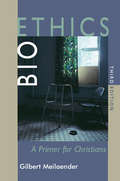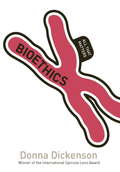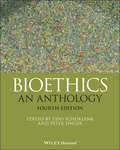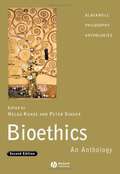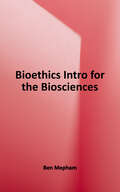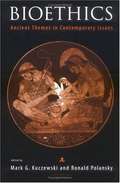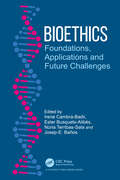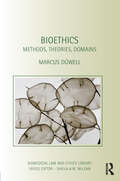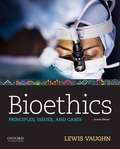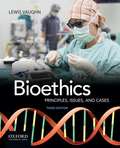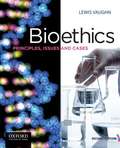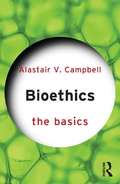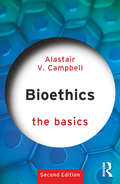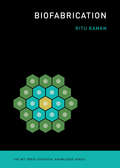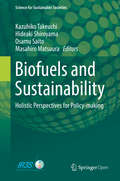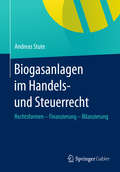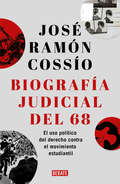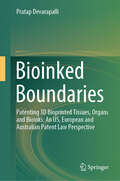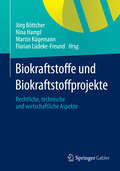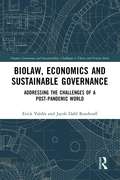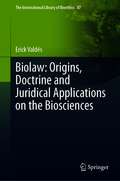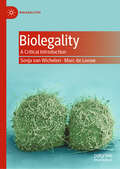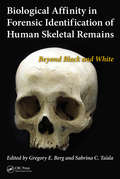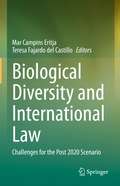- Table View
- List View
Bioethics: A Primer for Christians, Third Edition
by Gilbert MeilaenderIn the face of continuing advances in medical research and treatment, bioethics remains a serious ongoing social concern. For nearly two decades Gilbert Meilaender’s Bioethics has offered discerning Christian guidance on a wide range of pressing issues in medical ethics. Now in its third edition, Meilaender’s Bioethics covers abortion, assisted reproduction, genetic research, suicide and euthanasia, human experimentation — and much more — in language that is theologically informed, straightforward, and clear. This new edition includes updated information throughout and an added discussion of the need to protect Christian conscience in the practice of medicine.
Bioethics: All That Matters
by Donna DickensonIn this book:Donna Dickenson - Winner of the International Spinoza Lens AwardShould we do what ever science lets us do?Bioethics: All That Matters, new developments in biotechnology like genetics, stem cell research and artificial reproduction arouse both our greatest hopes and our greatest fears. Many people invest the new biotechnology with all the aspirations and faith once accorded to religious salvation. But does everyone benefit equally from scientific progress? Commercialised modern biomedicine runs the risk of exploiting vulnerable groups, from Indian 'surrogate' mothers to professional guinea pigs in drug research. Professor Dickenson argues that although we've entered new scientific territory, there's no need to jettison our existing moral sense. By discussing a range of real-life cases, she equips readers to make up their own minds on these important and controversial questions. Good science and good ethics needn't be contradictory.This accessible and concise book will appeal to both students and general readers, giving a fascinating introduction to a wide range of perspectives on Bioethics.All That Matters books:All books in the All That Matters series are written by world experts in their subject field. These experts work to distil a topic and get right to its heart, making the book accessible for both students and general readers. Each compelling book contains new and interesting perspectives and tells stories that matter.The Author:All That Matters - Interesting introductions to important issuesBooks on the following subjects are available from the All That Matters series: Muhammad, God, Water, Political Philosophy, Sustainability, Philosophy, Intelligence, Love, Russian Revolution, War, and Creativity.To find out more visit: www.allthatmattersbooks.com
Bioethics: An Anthology (Blackwell Philosophy Anthologies #27)
by Peter Singer Udo Sch KlenkThe new edition of the classic collection of key readings in bioethics, fully updated to reflect the latest developments and main issues in the field For more than two decades, Bioethics: An Anthology has been widely regarded as the definitive single-volume compendium of seminal readings on both traditional and cutting-edge ethical issues in biology and medicine. Acclaimed for its scope and depth of coverage, this landmark work brings together compelling writings by internationally-renowned bioethicist to help readers develop a thorough understanding of the central ideas, critical issues, and current debate in the field. Now fully revised and updated, the fourth edition contains a wealth of new content on ethical questions and controversies related to the COVID-19 pandemic, advances in CRISPR gene editing technology, physician-assisted death, public health and vaccinations, transgender children, medical aid in dying, the morality of ending the lives of newborns, and much more. Throughout the new edition, carefully selected essays explore a wide range of topics and offer diverse perspectives that underscore the interdisciplinary nature of bioethical study. Edited by two of the field’s most respected scholars, Bioethics: An Anthology: Covers an unparalleled range of thematically-organized topics in a single volume Discusses recent high-profile cases, debates, and ethical issues Features three brand-new sections: Conscientious Objection, Academic Freedom and Research, and Disability Contains new essays on topics such as brain death, life and death decisions for the critically ill, experiments on humans and animals, neuroethics, and the use of drugs to ease the pain of unrequited love Includes a detailed index that allows the reader to easily find terms and topics of interest Bioethics: An Anthology, Fourth Edition remains a must-have resource for all students, lecturers, and researchers studying the ethical implications of the health-related life sciences, and an invaluable reference for doctors, nurses, and other professionals working in health care and the biomedical sciences.
Bioethics: An Anthology (Second Edition)
by Peter Singer Helga KuhseThe expanded and revised edition of Bioethics: An Anthology is a definitive one-volume collection of key primary texts for the study of bioethics. Brings together writings on a broad range of ethical issues relating such matters as reproduction, genetics, life and death, and animal experimentation. Now includes introductions to each of the sections. Features new coverage of the latest debates on hot topics such as genetic screening, the use of embryonic human stem cells, and resource allocation between patients. The selections are independent of any particular approach to bioethics. Can be used as a source book to complement A Companion to Bioethics (1999).
Bioethics: An Introduction for the Biosciences
by Ben MephamBioethical issues remain front-page news, with debate continuing to rage over issues including genetic modification, animal cloning, and 'designer babies'. With public opinion often driven by media speculation, how can we ensure that informed decisions regarding key bioethical issues are made in a reasoned, objective way? Bioethics: An Introduction for the Biosciences offers a balanced, objective introduction to the field of bioethics, ideal for any biosciences student who is new to the subject. With a focus on developing the students' power of reasoning and judgement, the book presents different perspectives to common themes in an impartial way, fostering debate and discussion. The opening section, 'The Ethical Groundwork', introduces students to the nature of bioethics and ethical theory. The book goes on to lead students through a broad range of bioethical issues relating to people, animals, and food, before concluding with an overview of bioethics in practice. The current generation of students will become the next generation of decision makers. Bioethics: An Introduction for the Biosciences is the perfect introduction to a field with which every biosciences student should be familiar. Online Resource Centre The Online Resource Centre features: For registered adopters of the book: - Figures from the book in electronic format, ready to download For students: - A web link library and hyperlinked reference list, giving ready access to additional information sources; - Topical updates: extensive summaries of the latest developments in those topics covered in the book, ensuring that the reader can remain up-to-date at all times.
Bioethics: Ancient Themes in Contemporary Issues
by Mark G. Kuczewski Ronald M. PolanskyThis collection of essays explores themes from ancient Greek philosophy and medicine and their implications for contemporary medicine and bio-medical ethics. Thus the work examines the relationship of two of the most popular areas in the current revival of ethics, namely, classical ethics and biomedical ethics--areas that have seldom been brought together in any serious or sustained way. The essays in this volume are written by established classical scholars and bioethicists.
Bioethics: Foundations, Applications and Future Challenges
by Irene Cambra-Badii Ester Busquets-Alibés Terribas-Sala Núria Josep-E. BañosThe aim of this book is to introduce and discuss bioethics in a three-synergistic way: from the foundations to the current debates in relation to healthcare and social bioethics, and thereafter the possible future challenges. In this sense, the target audience can be from diverse disciplines: life and medical sciences, law, philosophy, psychology, and education. The book will be useful to high school students, in their first contacts with bioethics, college students, teachers and researchers, and the general public interested in these controversial debates of the past, present and future of bioethics.
Bioethics: Methods, Theories, Domains (Biomedical Law and Ethics Library)
by Marcus DüwellThis book is a philosophically-oriented introduction to bioethics. It offers the reader an overview of key debates in bioethics relevant to various areas including; organ retrieval, stem cell research, justice in healthcare and issues in environmental ethics, including issues surrounding food and agriculture. The book also seeks to go beyond simply describing the issues in order to provide the reader with the methodological and theoretical tools for a more comprehensive understanding of current bioethical debates. The aim of the book is to present bioethics as an interdisciplinary field, to explore its close relation to other disciplines (such as law, life sciences, theology and philosophy), and to discuss the conditions under which bioethics can serve as an academically legitimate discipline that is at the same time relevant to society. As a systematic and methodologically rigorous overview, Bioethics: Methods, Theories and Principles will be of particular interest to academics and students in the disciplines of Law, Medicine, Ethics and Philosophy. 'This is a book that embraces neither a single ethical theory nor a pragmatic melange of just-so-principles. It is a thoughtful and engaging analysis of diverse theoretical foundations in Bioethics. It is also an enormous step towards conceptual and philosophical clarity in this fascinating area.' - Professor Christian Illies, Chair for Practical Philosophy at the Otto-Friedrich University Bamberg, Germany
Bioethics: Principles, Issues, And Cases
by Lewis VaughnThis book explores the philosophical, medical, social, and legal aspects of key bioethical issues. Opening with a thorough introduction to ethics, bioethics, and moral reasoning, it then covers influential moral theories and the criteria for evaluating them. Integrating eighty-seven readings--ten of them new to this edition--substantive introductions to each issue, numerous classic bioethical cases, and abundant pedagogical tools, this text addresses the most provocative and controversial topics in bioethics.
Bioethics: Principles, Issues, And Cases, Third Edition
by Lewis VaughnBioethics: Principles, Issues, and Cases, Third Edition, explores the philosophical, medical, social, and legal aspects of key bioethical issues. Opening with a thorough introduction to ethics, bioethics, and moral reasoning, it then covers influential moral theories and the criteria forevaluating them. Integrating eighty-nine readings - twelve of them new to this edition - numerous classic bioethical cases, and abundant pedagogical tools, this text addresses the most provocative and controversial topics in bioethics. PEDAGOGICAL FEATURES:* "Classic Case Files" describe landmark cases that shaped the debate, while news-making "Cases for Evaluation" encourage students to form their own opinions* Various text boxes: "In Depth" boxes contain additional material, illustrations, or analyses, much of it "ripped from the headlines"; "Fact File" boxes provide statistics on the social, medical, and scientific facets of a chapter's topic; and "Legal Brief" boxes summarize important court rulingsand the status of major legislation* "Key Terms" are boldfaced and boxed off within the text and then defined in a glossary at the back of the book* "Applying Major Theories" sections at the end of each chapter help students relate theories to the issues
Bioethics: Principles, Issues, and Cases, Second Edition
by Lewis VaughnBioethics: Principles, Issues, and Cases, Second Edition, explores the philosophical, medical, social, and legal aspects of key bioethical issues. Opening with a thorough introduction to ethics, bioethics, and moral reasoning, it then covers influential moral theories and the criteria for evaluating them. Integrating eighty-five readings - thirteen of them new to this edition - numerous cases, and abundant pedagogical tools, the book addresses the most provocative and controversial topics in bioethics. Updated throughout, the second edition incorporates new information on justice, health care, and health insurance reform along with more coverage of issues related to race and culture and of the moral challenges facing nurses and other health care professionals. It also offers additional step-by-step guidance on how to identify and evaluate moral arguments in real-world contexts, with accompanying exercises and answers in an appendix.
Bioethics: The Basics
by Alastair V. CampbellBioethics: The Basics is an introduction to the foundational principles, theories and issues in the study of medical and biological ethics. Readers are introduced to bioethics from the ground up before being invited to consider some of the most controversial but important questions facing us today. Topics addressed include: The range of moral theories underpinning bioethics Arguments for the rights and wrongs of abortion, euthanasia and animal research Healthcare ethics including the nature of the practitioner-patient relationship Public policy ethics and the implications of global and public health Concise, readable and authoritative, this is the ideal primer for anyone interested in the study of bioethics.
Bioethics: The Basics (The Basics)
by Alastair V. CampbellBioethics: The Basics is an introduction to the foundational principles, theories and issues in the study of medical and biological ethics. Readers are introduced to bioethics from the ground up before being invited to consider some of the most controversial but important questions facing us today. Topics addressed include: the range of moral theories underpinning bioethics arguments for the rights and wrongs of abortion, euthanasia and animal research health care ethics including the nature of the practitioner-patient relationship public policy ethics and the implications of global and public health ‘3 parents’, enhancement, incidental findings and nudge approaches in health care. This thoroughly revised second edition provides a concise, readable and authoritative introduction for anyone interested in the study of bioethics.
Biofabrication (The MIT Press Essential Knowledge series)
by Ritu RamanHow engineered materials and machines powered by living biological cells can tackle technological challenges in medicine, agriculture, and global security.You are a biological machine whose movement is powered by skeletal muscle, just as a car is a machine whose movement is powered by an engine. If you can be built from the bottom up with biological materials, other machines can be as well. This is the conceptual starting point for biofabrication, the act of building with living cells--building with biology in the same way we build with synthetic materials. In this volume in the MIT Press Essential Knowledge series, Ritu Raman offers an accessible introduction to biofabrication, arguing that it can address some of our greatest technological challenges. After presenting the background information needed to understand the emergence and evolution of biofabrication and describing the fundamental technology that enables building with biology, Raman takes deep dives into four biofabrication applications that have the potential to affect our daily lives: tissue engineering, organs-on-a-chip, lab-grown meat and leather, and biohybrid machines. Organs-on-a-chip (devices composed of miniature model tissues), for example, could be used to test new medicine and therapies, and lab-grown meat could alleviate environmental damage done by animal farming. She shows that biological materials have abilities synthetic materials do not, including the ability to adapt dynamically to their environments. Exploring the principles of biofabrication, Raman tells us, should help us appreciate the beauty, adaptiveness, and persistence of the biological machinery that drives our bodies and our world.
Biofuels and Sustainability: Holistic Perspectives for Policy-making (Science for Sustainable Societies)
by Hideaki Shiroyama Osamu Saito Kazuhiko Takeuchi Masahiro MatsuuraThis open access book presents a comprehensive analysis of biofuel use strategies from an interdisciplinary perspective using sustainability science. This interdisciplinary perspective (social science-natural science) means that the strategies and policy options proposed will have significant impacts on the economy and society alike. Biofuels are expected to contribute to reducing greenhouse gas emissions, revitalizing economies in agricultural communities and alleviating poverty. However, despite these anticipated benefits, international organizations such as the FAO, OECD and UN have published reports expressing concerns that biofuel promotion may lead to deforestation, water pollution and water shortages. The impacts of biofuel use are extensive, cross-sectoral and complex, and as such, comprehensive analyses are required in order to assess the extent to which biofuels can contribute to sustainable societies. Applying interdisciplinary sustainability science concepts and methodologies, the book helps to enhance the establishment of a sustainable society as well as the development of appropriate responses to a global need for urgent action on current issues related to biofuels.
Biogasanlagen im Handels- und Steuerrecht: Rechtsformen – Finanzierung – Bilanzierung
by Andreas StuteDieses Buch dient als Leitfaden für die Abbildung des betrieblichen Geschehens von Biogasanlagen sowohl im Handelsrecht als auch im Steuerrecht. Von der Gründung und Wahl der Rechtsform über die Finanzierungsphase zu den Herstellungs-, Vertriebs- und Verwaltungsprozessen werden wichtige Fragen immer mit Blick auf die bilanzielle Abbildung beantwortet. Der Aufbau des Buches orientiert sich chronologisch an diesen verschiedenen Phasen, sodass Praktiker, Buchhalter und steuerliche Berater jederzeit die richtige Hilfestellung finden. Zahlreiche Berechnungsbeispiele und Vorlagen machen das Werk zu einer wertvollen Arbeitshilfe.
Biografía judicial del 68: El uso político del derecho contra el movimiento estudiantil
by José Ramón Cossío DíazDetrás de los macanazos y las balas, hubo un sistema judicial que convalidó la represión y actuó convencido de su bondad. Nació el 26 de julio de 1968 y murió dos años después. Pero en su corta vida, multiplicó la iniquidad y la injusticia, provocó el encarcelamiento de decenas de jóvenes y evidenció la saña del Estado. Ésta es la historia -nunca antes contada- del proceso judicial contra los implicados en el 68 mexicano. Arranca con la apertura de una averiguación previa y expira cuando se dictan las sentencias condenatorias. En esta obra, que marca un parteaguas en los estudios sobre el movimiento estudiantil del 68, el exministro de la Suprema Corte José Ramón Cossío nos entrega una labor realizada por varias décadas: el análisis de los 60 tomos de aquel proceso, y presenta las evidencias que demuestran los vicios del juicio, las confesiones del ministerio público, las frases autoinculpatorias del juez y las defensas desesperadas de los estudiantes torturados que intentaban evitar Lecumberri.
Bioinked Boundaries: Patenting 3D Bioprinted Tissues, Organs and Bioinks: An US, European and Australian Patent Law Perspective
by Pratap DevarapalliThis book presents a comprehensive and comparative study of the patentability of bioprinting inventions, specifically bioinks and bioprinted tissues, in the US, the Europe and Australia. It employs a two-phase analysis to understand, ‘Is the patentable subject matter requirement a hurdle to patenting bioprinting inventions, specifically bioinks and bioprinted tissues?’ The first phase is a doctrinal analysis of the patent laws and jurisprudence in respective jurisdictions, highlighting the similarities and differences in their approaches to the subject matter requirement. The second phase is an empirical analysis of the patent prosecution data from patent applications filed in each jurisdiction with claims directed towards bioprinted tissues and bioinks, revealing how patent examiners apply the patent provisions to accept or object to such patent claims. The book offers several contributions to the field of bioprinting and patent law. First, it provides a detailed and up-to-date overview of the current state of the art and the legal landscape of bioprinting inventions. Second, it identifies the main criteria and factors that patent examiners use to assess the patentable subject matter of bioprinted tissues and bioinks, such as the level of human intervention, the markedly different characteristics, and the industrial applicability. Third, it proposes patenting framework models for each jurisdiction, which can assist patent applicants to draft and amend their patent claims in accordance with the patentable subject matter requirement. Fourth, it evaluates the potential benefits and implications of patenting bioprinting inventions for the bioprinting industry and society at large, such as fostering innovation, promoting public health, and indirectly addressing ethical and social issues. The main benefit that the reader will derive from the book is a deeper understanding of the patentability of bioprinting inventions, specifically bioinks and bioprinted tissues, in different jurisdictions and contexts. The book will help the reader to appreciate the legal and technical aspects of bioprinting and patent law, and how they affect the bioprinting industry and society at large.
Biokraftstoffe und Biokraftstoffprojekte: Rechtliche, technische und wirtschaftliche Aspekte
by Jörg Böttcher Nina Hampl Martin Kügemann Florian Lüdeke-FreundDieses Buch beschäftigt sich mit Biokraftstoffen und Biokraftstoffprojekten. Die Autoren zeigen auf, welche rechtlichen, agrarischen, ökologischen und ökonomischen Rahmenbedingungen von Biokraftstoffen beachtet werden müssen. Die Betrachtung dieser Rahmenbedingungen und weiterer - eher anlagenbezogener - Faktoren ermöglicht es dann, Rückschlüsse auf die Realisierung von Biokraftstoffvorhaben zu ziehen. Besonderes Augenmerk wird dabei auf den sensiblen Themenkomplex der Nachhaltigkeit von Biokraftstoffen gerichtet. Die anhaltende Diskussion unerwünschter sozialer, ökologischer und ökonomischer Effekte hat zu neuen und bislang nicht abschließend definierten gesellschaftlichen und politischen Ansprüchen an die Biokraftstoffindustrie geführt.
Biolaw, Economics and Sustainable Governance: Addressing the Challenges of a Post-Pandemic World (Finance, Governance and Sustainability)
by Erick Valdés Jacob Dahl RendtorffThis book offers an accurate and updated approach to the main contributions of cosmopolitan biolaw in relation to sustainability, global governance, organizational health care economics and COVID-19. Bringing together different robust and dense biojuridical epistemologies to analyze key bioethical problems as well as the health care, management, economics and sustainability issues of our time, it constitutes a paradigmatic text in its field. In addition to exploring different epistemologies and jurisdictional scopes of biolaw, including the relationships between this new field and the challenges which have arisen in the current globalized and technologized world, the book addresses controversial issues straight from today’s headlines: for example, the basics for health care, finance and organizational economics, global biojuridical principles for governance, globalization, bioscientific empowerment, global and existential risk and sustainability challenges for a post-pandemic world. The book encourages readers to think impartially in order to know and understand the bioethical and biojuridical dilemmas that stem from current economics and sustainability issues. Accordingly, it will be a valuable resource for courses in the fields of biolaw, law, bioethics, global sustainability, organizational health care economics, and global governance at different professional levels.
Biolaw: Origins, Doctrine and Juridical Applications on the Biosciences (The International Library of Bioethics #87)
by Erick ValdésThis book configures a consistent epistemology of biolaw that distinguishes itself from bioethics and from a mere set of international instruments on the regulation of biomedical practices. Such orthodox intellection has prevented biolaw from being understood as a new branch of law with legally binding force, which has certainly dwindled its epistemological density. Hence, this is a revolutionary book as it seeks to deconstruct the history of biolaw and its oblique epistemologies, which means not accepting perennial axioms, and not seeing paradigms where only anachronism and anomaly still exist. It is a book aimed at validity, but also at solidity because the truth of biolaw has never been told before. In that sense, it is also a revealing text. The book shapes biolaw as an independent and compelling branch of law, with a legally binding scope, which boosts the effectiveness of new deliberative models for legal sciences, as well as it utterly reinforces hermeneutical and epistemological approaches, in tune with the complexity of disturbing legal scenarios created by biomedical sciences’ latest applications. This work adeptly addresses the origins of the European biolaw and its connections with American bioethics. It also analyses different biolaw’s epistemologies historically developed both in Europe and in the United States, to finally offer a new conception of biolaw as a new branch of law, by exploring its theoretical and practical atmospheres to avoid muddle and uncertainty when applied in biomedical settings. This book is suitable for academics and students of biolaw, law, bioethics, and biomedical research, as well as for professionals in higher education institutions, courts, the biomedical industry, and pharmacological companies.
Biolegality: A Critical Introduction (Biolegalities)
by Marc de Leeuw Sonja van WichelenThis book provides a comprehensive analysis of the empirical and theoretical problems posed by the encounter between law and biology in the twenty-first century. How does biotechnology and new bioscientific knowledge affect our legal institutions, our sense of justice, and our ways of relating to one another? To answer these questions, authors Marc de Leeuw and Sonja van Wichelen examine the complex and often contested ways in which biotechnology and biological knowledge are reworked by, with, and against legal knowledge. As this book shows, recent developments in the life sciences—including molecular biology, immunology, and the neurosciences—and their applications in forensics, medicine, and agriculture test longstanding legal forms, such as property, personhood, parenthood, and (collective) identity, ultimately constituting the current field of “biolegality.” The authors argue that these biolegal contestations represent philosophical and anthropological challenges to existing understandings of exchange, self, kinship, and community. By addressing how biology and law inform new ways of relating and knowing, the book proposes a programmatic intervention, asserting the pivotal role the study of biolegality plays in advancing social and political theory.
Biological Affinity in Forensic Identification of Human Skeletal Remains: Beyond Black and White
by Gregory E. Berg Sabrina C. Ta’alaAncestry determination in the identification of unknown remains can be a challenge for forensic scientists and anthropologists, especially when the remains available for testing are limited. There are various techniques for the assessment of ancestry, ranging from traditional to new microbiological and computer-assisted methods. Biological Affinity
Biological Diversity and International Law: Challenges for the Post 2020 Scenario
by Mar Campins Eritja Teresa Fajardo del CastilloThe book focuses on the interactions between international legal regimes related to biodiversity governance. It addresses the systemic challenges by analyzing the legal interactions between international biodiversity law and related international law applicable to economic activities, as well as issues related to the governance of biodiversity based on functional, normative, and geographic dimensions, in order to present a crosscutting, holistic approach. The global COVID-19 pandemic, the imminent revision of the Strategic Plan for Biodiversity 2011-2020, and the Aichi Targets have created the momentum to focus on the interactions between the Convention on Biological Diversity and other international environmental regimes. Firstly, it discusses the principles that inspire biodiversity-related conventional law, the soft law that conveys targets for enforcement of the Biodiversity Convention, their structural, regulatory and implementation gaps, the systemic relations arising from national interests, and the role of scientific advisory bodies in biodiversity-related agreements. The second part then addresses interactions in specific conventional frameworks, such as the law of multilateral trade and global public health, and the participation of communities in the management of genetic resources. Lastly, the third part illustrates these issues using four case studies focusing on the challenges for sustainability and marine biodiversity in small islands, the Arctic Ocean, the Caribbean Sea, and the Mediterranean Sea, as a way to strengthen a horizontal and joint approach. The book is primarily intended for academics, researchers, and students interested in international environmental law and policy and in interactions for creating conditions for fair, sustainable, and resilient environmental development. By offering an analysis of instruments and criteria for systemic relations in those areas, it will also appeal to public and private actors at the domestic and international level.
Biological Evidence
by Ann Bucholtz Jon Lewis"The text is an introduction to the types of biological evidence commonly found at crime scenes and how to collect it for non-science majors and for professionals working in the criminal justice system. Specific biological evidence discussed includes blood, semen, saliva, urine, feces, hair, and fingernails. Additional topics include autopsy, the basic departments of the crime laboratory, toxicology, forensic entomology, and uncollectible biological evidence. Packaging, preservation, and care of biological evidence is discussed and chain of custody is explained. Additional topics include DNA, case studies, courtroom testimony, and exhibits for the courtroom.
